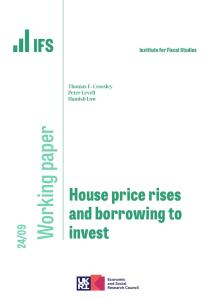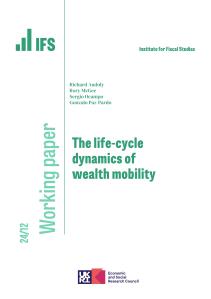One million working-age adults on middle incomes (i.e. excluding the richest and poorest fifths of the population) have less than one month’s income saved in an accessible form and say that they would not be able to meet an unexpected financial outlay of that magnitude. They report not being able to use their (modest) savings, borrow, or get help from family or friends to meet an expense costing one month’s income. This implies large numbers are at risk of financial difficulty in the event of a drop in their income or an unanticipated expense.
Having low levels of savings is very common for low-income people. On the eve of the pandemic, 70% of the lowest-income tenth of the working-age population had less than £2,000 saved. But even in the middle of the income distribution, 43% had less than £2,000. So, for a significant minority of working-age middle-income adults, a ‘rainy day’ event to their finances could prove very challenging.
This is one of the key findings from new research published today by IFS, funded by the IFS Retirement Savings Consortium and the Economic and Social Research Council, which focuses on people with low levels of savings and how problematic that can be.
Other key findings from the report include:
- Those with low levels of financial literacy have lower levels of savings. Even after accounting for income, education, age, debt and other individual characteristics, those who could not correctly answer relatively simple questions about a bank statement, interest rates and inflation were 8 percentage points more likely to have low savings (i.e. less than £2,000) compared with those who could answer all three correctly.
- Having low levels of savings is very persistent. 70% of those with low savings on the eve of the pandemic had had low levels of savings for at least the last four years. The lowest-income, least financially literate, and least-educated groups, holding other factors constant, are more likely to have persistently rather than temporarily low savings levels.
- Experiences during the COVID-19 pandemic highlight the important role played by savings in protecting people from financial difficulties. Looking at who became unemployed, were furloughed, or lost all their self-employment work at the start of the pandemic, those with no savings were 6 percentage points more likely to fall into arrears on household bills in April 2020 than those who had one month’s income saved.
- The role played by savings is particularly important for those with less support from the state. Self-employed people received much less support at the very start of the pandemic than furloughed employees. Not having any savings was much worse for them. Among the self-employed who lost all their work, those with no savings were 16 percentage points more likely subsequently to fall behind on bills compared with those with one month’s income saved.
Bee Boileau, a Research Economist at IFS and an author of the report, said:
‘There are large numbers of middle-income working-age adults with little or nothing set aside for a rainy day. Some might be able to borrow on credit cards, or from friends or family, but a million middle-income people would not be able to meet a significant unexpected expense. With low levels of financial literacy associated with having few savings, one avenue for policy could be to work to boost financial literacy levels in the population.’
Tom Wernham, a Research Economist at IFS and another author of the report, said:
‘Experiences during the pandemic show how important it is for people to have some savings. When bad financial shocks hit, those with some savings were much less likely to fall into financial difficulties than those with little or nothing set aside. This is particularly important for those who do not have access to financial support from family or friends, or for whom state support is more limited.’










